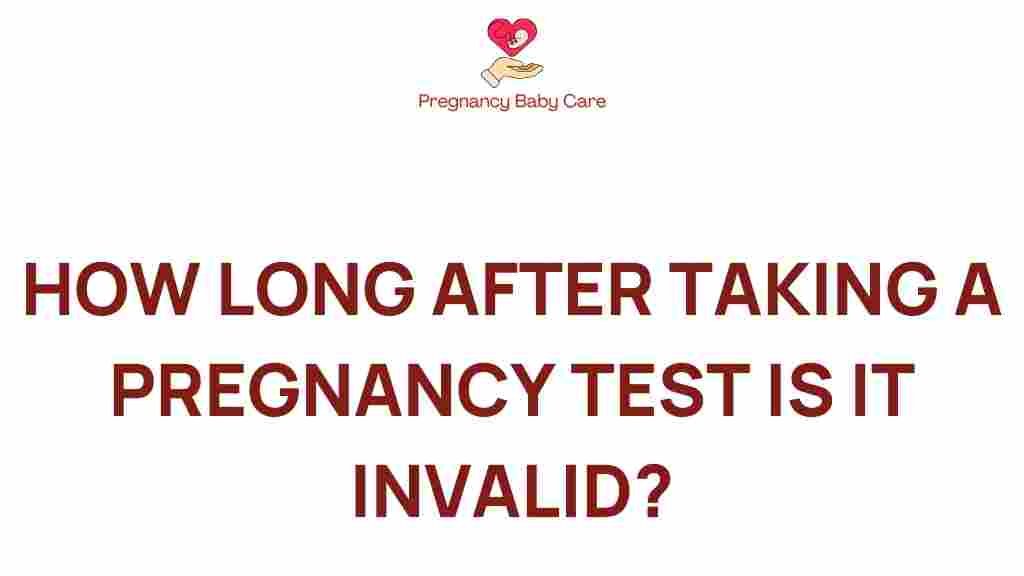Unraveling the Mystery: How Long After a Pregnancy Test Is It Invalid?
When it comes to understanding pregnancy tests, one of the most common questions is: how long after a pregnancy test is it invalid? This question is crucial for those trying to conceive or those who may be uncertain about their pregnancy status. To provide clarity, we will explore the validity of pregnancy tests, the importance of timing, and how to interpret results accurately. Misconceptions abound, so let’s unravel the mystery together.
Understanding Pregnancy Tests
A pregnancy test is a diagnostic tool that detects the presence of the hormone human chorionic gonadotropin (hCG) in your body. This hormone is produced shortly after a fertilized egg attaches to the uterine lining. The accuracy and validity of these tests depend on several factors, including timing, hormone levels, and adherence to the testing instructions.
The Testing Window
To ensure accurate results, it’s essential to test at the right time. Here’s what you need to know about the testing window:
- Timing: The best time to take a pregnancy test is after a missed period. This is typically about two weeks after conception.
- Early Testing: Some tests claim they can detect pregnancy a few days before your missed period, but results may be less reliable at this stage.
- First Morning Urine: For the most accurate results, it’s advisable to use the first morning urine, as it contains the highest concentration of hCG.
How Long After a Pregnancy Test Is It Valid?
The validity of a pregnancy test can be influenced by various factors:
- Expiration Date: Always check the expiration date on the test package. An expired test may yield inaccurate results.
- Storage Conditions: Tests should be stored in a cool, dry place. High humidity or extreme temperatures can affect their accuracy.
- Time Limit for Reading Results: After conducting the test, results generally need to be read within a specific time frame, usually 3 to 10 minutes, depending on the brand.
After this time, the test may be considered invalid, as chemical reactions that indicate pregnancy can continue to develop, leading to misleading results.
Interpreting Pregnancy Test Results
Interpreting the results of a pregnancy test can be straightforward, but it’s essential to know what each outcome means:
- Positive Result: If you see two lines or a plus sign, you are likely pregnant. Confirm with a healthcare provider.
- Negative Result: One line or a minus sign indicates that you are not pregnant, but retest if your period does not start.
- Invalid Result: If the test does not show any lines, or if the results are unreadable, the test is invalid. Repeat the test with a new kit.
Misperceptions About Pregnancy Tests
There are several misconceptions about the validity and accuracy of pregnancy tests:
- Testing Too Early: Many women believe they can test immediately after conception, but this is not accurate. Testing too early may lead to false negatives due to low hCG levels.
- Evaporation Lines: An evaporation line can appear if the test is read after the recommended time. This line is not an indication of pregnancy.
- Testing After a Miscarriage: It’s important to note that hCG levels may remain elevated for weeks post-miscarriage, leading to potential confusion.
Factors Influencing Hormone Levels
Several factors can influence hCG hormone levels and, consequently, the results of a pregnancy test:
- Multiple Pregnancies: Carrying twins or multiples can result in higher hCG levels, potentially leading to earlier positive results.
- Medications: Certain fertility treatments or medications containing hCG can affect test outcomes.
- Health Conditions: Conditions such as ectopic pregnancies or trophoblastic diseases can cause abnormal hCG levels, leading to misleading test results.
Step-by-Step Process of Taking a Pregnancy Test
To ensure the accuracy and validity of your pregnancy test, follow these steps:
- Choose the Right Test: Select a reputable brand that is known for accuracy.
- Check the Expiration Date: Ensure the test is not expired.
- Follow Instructions: Read the instructions carefully and follow them exactly.
- Collect Urine Sample: Use the first morning urine for the best results.
- Wait for Results: Allow the test to process for the recommended time.
- Interpret Results: Read the results within the specified time frame.
- Consult Healthcare Provider: Regardless of the result, consider consulting a healthcare provider for further guidance.
Troubleshooting Common Issues
If you encounter issues or uncertainties while taking a pregnancy test, consider these troubleshooting tips:
- Retest: If you receive an invalid result, try using a new test.
- Check Storage: Ensure the test was stored correctly.
- Timing: If you tested too early, wait a few days and retest.
- Consult a Professional: If results are confusing or symptoms persist, contact a healthcare provider.
When to Seek Healthcare Guidance
It’s essential to seek healthcare guidance in the following scenarios:
- Positive test results followed by unexpected symptoms.
- Negative results with persistent pregnancy symptoms.
- History of irregular periods or health conditions that may affect pregnancy.
For more information on pregnancy tests and reproductive health, you can visit this resource.
Conclusion
Understanding how long after a pregnancy test is it invalid is vital for anyone navigating the complexities of pregnancy testing. By knowing the importance of timing, recognizing the factors that affect test results, and being aware of common misconceptions, you can ensure more accurate and reliable outcomes.
Always remember that if you have doubts or concerns regarding your results, consulting a healthcare professional is the best course of action. They can provide the necessary guidance and support based on your individual circumstances, ensuring that you have the best information available as you navigate your reproductive health.
Stay informed, stay healthy, and empower yourself with knowledge about pregnancy tests and their validity.
This article is in the category Pregnancy and created by PregnancyBabyCare Team
